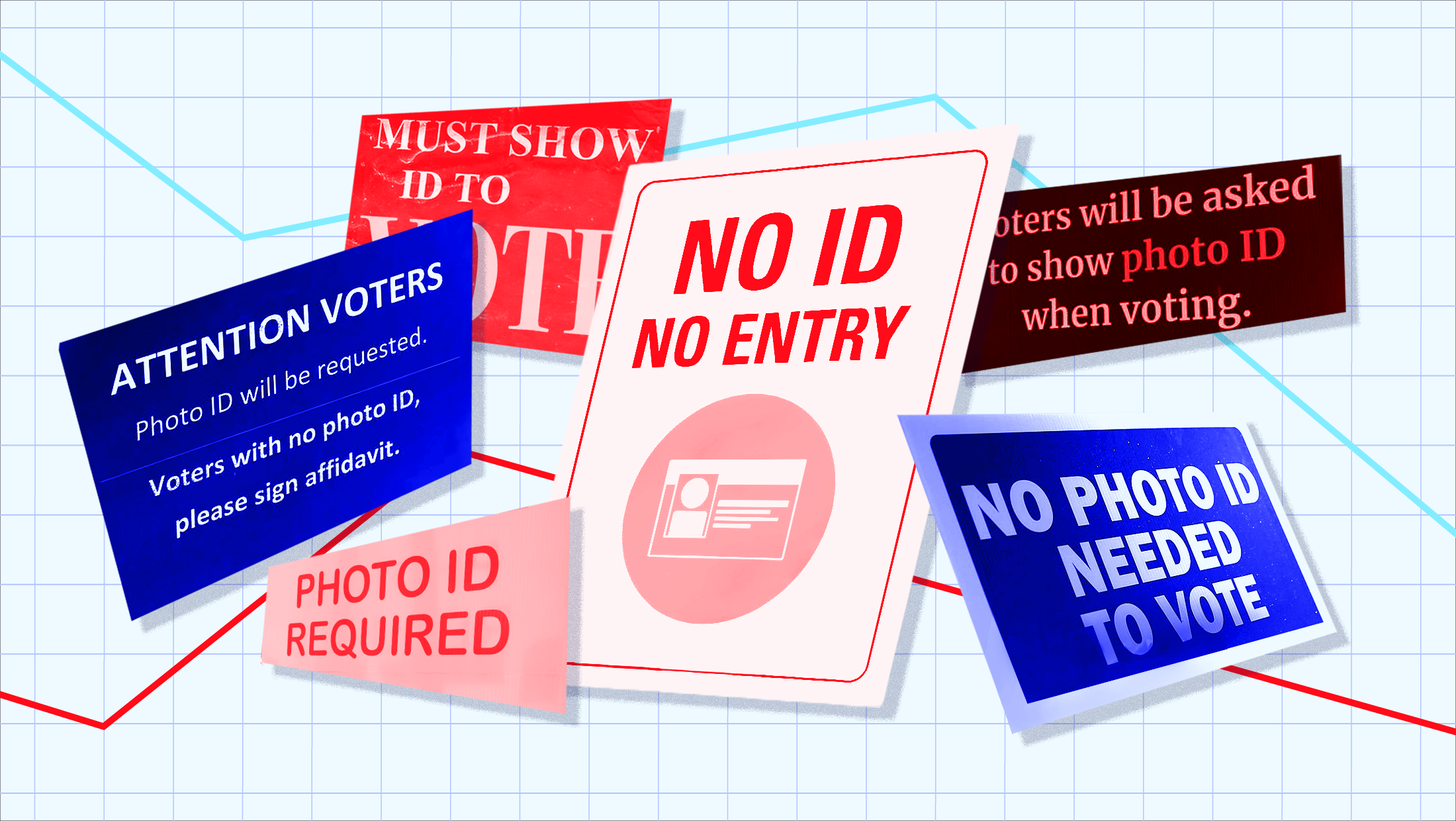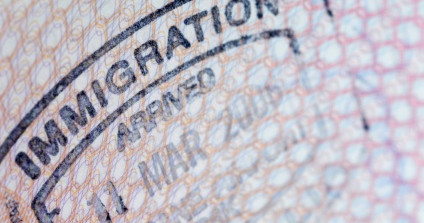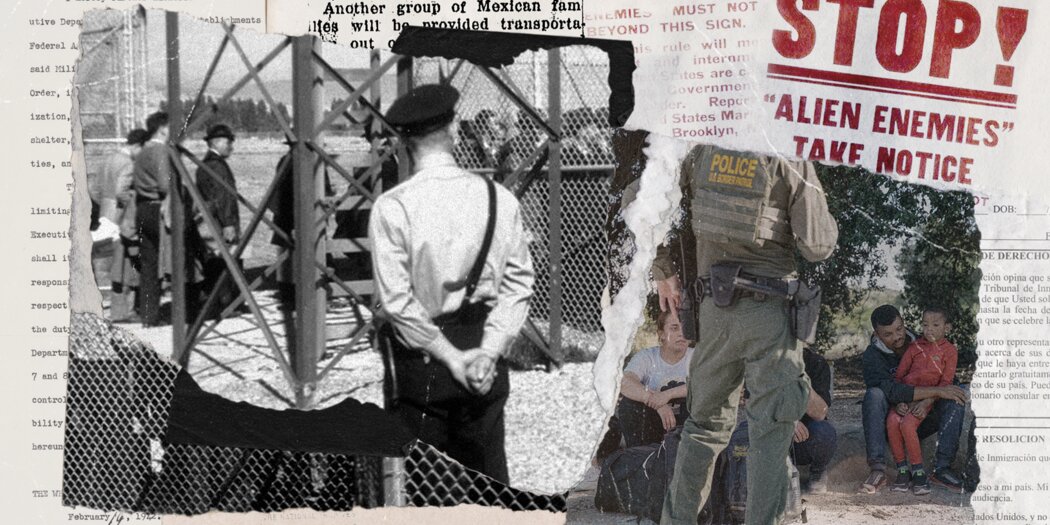he's going to label black americans enemies of the united states.
This detention and deportation power poses an alarming risk of abuse and rights violations in both wartime and peacetime.

www.brennancenter.org
What is the Alien Enemies Act?
The Alien Enemies Act of 1798 is a wartime authority that allows the president to detain or deport the natives and citizens of an enemy nation. The law permits the president to target these immigrants without a hearing and based only on their country of birth or citizenship. Although the law was enacted to prevent foreign espionage and sabotage in wartime, it can be — and has been — wielded against immigrants who have done nothing wrong, have evinced no signs of disloyalty, and are lawfully present in the United States. It is an overbroad authority that may violate constitutional rights in wartime and is subject to abuse in peacetime.
Has the Alien Enemies Act been used in the past?
The Alien Enemies Act has been invoked three times, each time during a major conflict: the War of 1812, World War I, and World War II. In World Wars I and II, the law was a key authority behind detentions, expulsions, and restrictions targeting German, Austro-Hungarian, Japanese, and Italian immigrants based solely on their ancestry. The law is
best known for its role in Japanese internment, a shameful part of U.S. history for which Congress, presidents, and the courts have apologized.
Under what conditions can the president invoke the Alien Enemies Act?
The president
may invoke the Alien Enemies Act in times of “declared war” or when a foreign government threatens or undertakes an “invasion” or “predatory incursion” against U.S. territory. The Constitution
gives Congress, not the president, the power to declare war, so the president must wait for democratic debate and a congressional vote to invoke the Alien Enemies Act based on a declared war. But the president need not wait for Congress to invoke the law based on a threatened or ongoing invasion or predatory incursion. The president has
inherent authority to repel these kinds of sudden attacks — an authority that necessarily implies the discretion to decide when an invasion or predatory incursion is underway.
Do the terms
As the
Supreme Court and
past presidents have acknowledged, the Alien Enemies Act is a wartime authority enacted and implemented under the war power. When the Fifth Congress passed the law and the Wilson administration defended it in court during World War I, they did so on the understanding that noncitizens with connections to a foreign belligerent could be “
treated as prisoners of war” under the “
rules of war under the law of nations.” In the Constitution and other late-1700s statutes, the term
invasion is
used literally, typically to refer to large-scale attacks. The term
predatory incursion is also used literally in
writings of that period to refer to slightly smaller attacks like the 1781 Raid on Richmond led by American defector Benedict Arnold.
Today, some anti-immigration
politicians and
groups urge a non-literal reading of
invasion and
predatory incursion so that the Alien Enemies Act can be invoked in response to unlawful migration and cross-border narcotics trafficking. These politicians and groups view the Alien Enemies Act as a turbocharged deportation authority. But their proposed reading of the law is at odds with centuries of legislative, presidential, and judicial practice, all of which confirm that the Alien Enemies Act is a wartime authority. Invoking it in peacetime to bypass conventional immigration law would be a staggering abuse.
Is there any way in which the Alien Enemies Act could be used outside of war?
Although the Alien Enemies Act has only been invoked in major conflicts, Presidents Woodrow Wilson and Harry S. Truman continued using the law after the cessation of hostilities in World Wars I and II. World War I ended in 1918, but the Wilson administration used the law to intern German and Austro-Hungarian immigrants until 1920. And World War II ended in 1945, but the Truman administration used the law for internment and deportations until 1951. In its 1948
Ludecke v. Watkins opinion, a narrow majority of the Supreme Court upheld the Truman administration’s extended reliance on the Alien Enemies Act, reasoning that it was not the judiciary’s place to second-guess the president on a matter as “political” as when a war terminates and wartime authorities expire.
If the courts upheld postwar uses of the Alien Enemies Act, can we rely on them to strike down peacetime abuses of the law?
The courts
should strike down any attempted peacetime use of the Alien Enemies Act, but the political question doctrine may prevent them from doing so. This
doctrine cautions the courts against addressing issues that fall within Congress and the president’s constitutional duties and that lack judicially manageable standards for resolution. The courts have used the political question doctrine to avoid resolving claims that touch on matters of war and peace, as well as other sensitive foreign policy matters.
In the 1990s, they
relied on the doctrine
to dismiss claims that the Clinton administration was permitting a migration “invasion,” in violation of Article IV of the Constitution. And in other cases, the courts have held that
the president’s recognition of a foreign government
is binding on the judiciary. If the courts were to deploy the same reasoning here, it could allow the president to invoke the Alien Enemies Act based on a migrant “invasion” or “predatory incursion” perpetrated by a cartel alleged to be acting as a de facto foreign government.
Is there a way around the political question doctrine?
According to the Supreme Court’s 1962
Baker v. Carr opinion, which formalized the political question doctrine, the courts can wade into the political thicket to correct “an obvious mistake” or “manifestly unauthorized exercise of power.” The courts have never relied on this backstop, however, and there is little clarity regarding when or how it could be applied.
But even if the courts refuse to second-guess whether there has been an invasion or predatory incursion by a foreign government, they would still be able to consider constitutional and other purely legal challenges to the president’s authority. As the Brennan Center explains in its
report on the Alien Enemies Act, the law raises serious concerns under the Constitution’s guarantees of equal protection and due process. Although not the focus of our research, the law also raises concerns under U.S. laws implementing the 1967 Refugee Protocol and Convention Against Torture, as well as under constitutional separation-of-powers theories that limit the authority Congress can delegate to the president. The courts could strike down or limit the Alien Enemies Act on any of these grounds.
Congress, too, could repeal the Alien Enemies Act to prevent or stop abuse. Rep. Ilhan Omar (D-MN) and Sen. Mazie Hirono (D-HI) have already introduced a repeal bill, the Neighbors Not Enemies Act, in the House and Senate. Congress should pass their bill without delay before a future president tries to abuse the Alien Enemies Act.
What are the Brennan Center’s concerns with the Alien Enemies Act’s constitutionality?
The Fifth Amendment protects U.S. citizens and immigrants against discrimination and rights violations perpetrated by the federal government. The courts typically strike down policies that discriminate based on a suspect classification, such as race or ancestry, and policies that infringe on fundamental rights.
The Alien Enemies Act discriminates against immigrants based on their country of citizenship and, more broadly, based on their ancestry. The breadth of the law’s discrimination is apparent on the face of the law and from its history. By
its text, the Alien Enemies Act covers not only the citizens of a foreign belligerent but also the “natives” — or individuals who were born in the enemy state but renounced their citizenship and no longer owe allegiance to that state. The law’s application to “natives” clarifies the law’s focus on birth heritage and its conflation of ancestry with disloyalty in wartime. In the decades following World War II, when
Congress and the
executive branch apologized for Japanese, German, and Italian internment, they recognized that immigrants had been targeted, regulated, and interned under the Alien Enemies Act based on their ancestry.
The Alien Enemies Act also runs afoul of the right to be free from indefinite civil detention, as recognized by the Supreme Court in its 2001
Zadvydas v. Davis opinion. Wartime detentions are necessarily indefinite, as states do not negotiate the length of their hostilities at the outset of a conflict. During World War II, some immigrants were interned for
more than 10 years, even though they were civilians and were not charged with any unlawful activity.
More broadly, the Alien Enemies Act conflicts with a central theme of American law and ethos: the right to be judged as an individual, particularly for high-stakes decisions such as detention or deportation. Across U.S. history, only one other law authorized identity-based deportations. That law, the Geary Act of 1892, was passed as a part of Chinese exclusion, and it reflects another shameful chapter of U.S. history that has been the subject of
congressional and
presidential apologies — not unlike internment under the Alien Enemies Act.
These shortcomings should lead a court to strike down the Alien Enemies Act if the law is once again invoked, whether in peacetime or in war. But they should also prompt Congress to repeal this outdated and dangerous law, lest the nation repeat the mistakes of its past.











